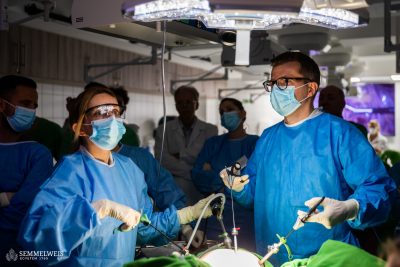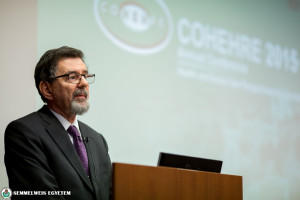The Budapest University of Technology and Economics (BME) and Semmelweis University (SE) have won support for their joint interdisciplinary engineering and molecular biology project within the framework of the New Széchenyi Plan. The project is aimed at developing uniform teaching aids to be used in medical and engineering higher education.
 The biotechnology sector – one of the potential breakthrough points of Hungarian industry – has undergone explosive growth in the past two decades. Today, biotechnology uses the entire toolkit of biochemistry and molecular biology. The role of computer simulations and methods assisted by modern technological devices is gradually growing, in many instances supporting or even replacing empirical-based biotechnology. A similar process may be observed in molecular genetics and genomics as well, which have become an indispensable part of medical science, and which use increasingly complex diagnostic and therapeutic devices. Despite the paramount importance of these fast-developing areas, their research and educational activities are fragmented, with neither connection points between the individual subjects nor interdisciplinary passages.
The biotechnology sector – one of the potential breakthrough points of Hungarian industry – has undergone explosive growth in the past two decades. Today, biotechnology uses the entire toolkit of biochemistry and molecular biology. The role of computer simulations and methods assisted by modern technological devices is gradually growing, in many instances supporting or even replacing empirical-based biotechnology. A similar process may be observed in molecular genetics and genomics as well, which have become an indispensable part of medical science, and which use increasingly complex diagnostic and therapeutic devices. Despite the paramount importance of these fast-developing areas, their research and educational activities are fragmented, with neither connection points between the individual subjects nor interdisciplinary passages.
The current project offers 19 matching curricula for medical and engineering education, including the foundations of biochemistry, molecular biology, genetics, medical genetics and genomics; measurement technologies of molecular biology and medical biology; the design of statistical experiments; data analysis based on biostatistics and machine learning; the modelling of biological systems and causation; and clinical decision-making support tools.
 In addition to an extensive international collaborative circle, the project team relies heavily on the experiences of the highly successful American higher educational project, the Genomic Consortium for Active Teaching (GCAT), which also serves as the project’s official sponsor. The plan for a biotechnology-bioinformatics “virtual laboratory” makes possible – in spite of the scarcity of university resources – the domestic adaption of the GCAT programme’s objectives, facilitating the active learning of molecular biology methods which are, at present, still rather expensive and high-throughput. The project’s adjustment to real industrial needs and the presence of state of the art technologies is ensured by that fact that its professional sponsors include some of the world’s largest pharmaceutical and research device development companies.
In addition to an extensive international collaborative circle, the project team relies heavily on the experiences of the highly successful American higher educational project, the Genomic Consortium for Active Teaching (GCAT), which also serves as the project’s official sponsor. The plan for a biotechnology-bioinformatics “virtual laboratory” makes possible – in spite of the scarcity of university resources – the domestic adaption of the GCAT programme’s objectives, facilitating the active learning of molecular biology methods which are, at present, still rather expensive and high-throughput. The project’s adjustment to real industrial needs and the presence of state of the art technologies is ensured by that fact that its professional sponsors include some of the world’s largest pharmaceutical and research device development companies.
The project’s outstanding academic background is provided by the joint research-based interdisciplinary collaboration between Semmelweis University and the Budapest University of Technology and Economics. The presence of aspects of modern teaching methodology is assured by prestigious professional organisations, while the high quality of the curriculum development’s final product is guaranteed by consortium member Typotex Publishing House.
Project duration: 2 years (January 1, 2012-December 31, 2013);
Total budget: 154, 505, 933 Ft.
Source: Consortium for the active learning of biotechnology and bioinformatics [Konzorcium a biotechnológia és bioinformatika aktív tanulásáért]
Translated by Gina Varga-Gönczi



